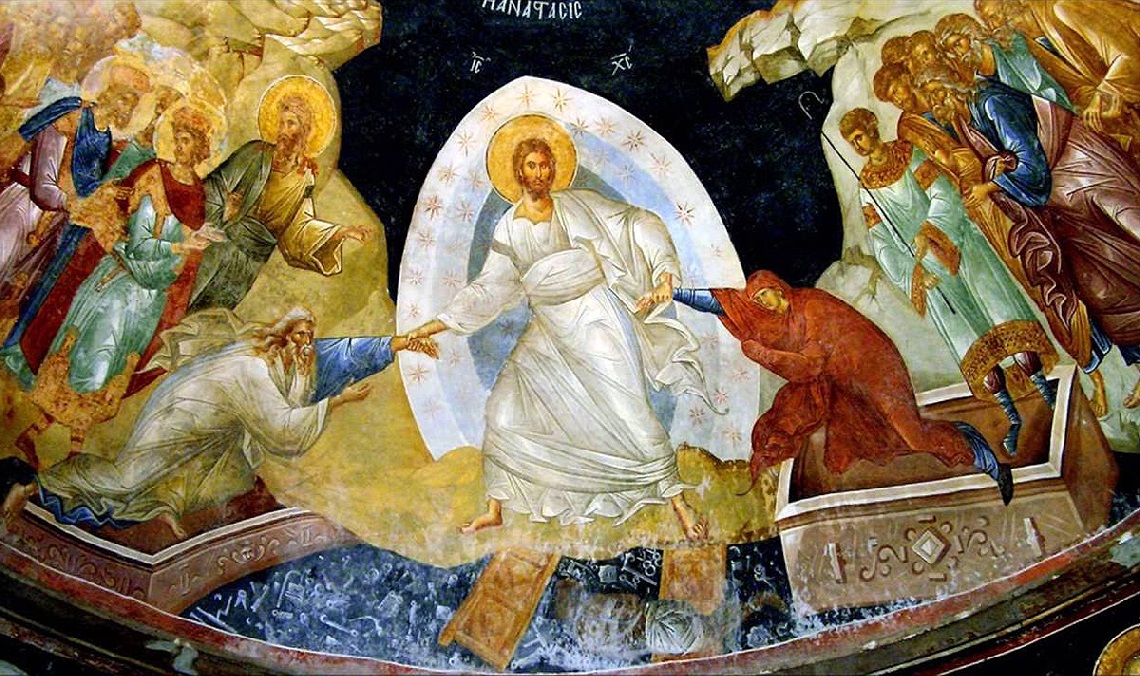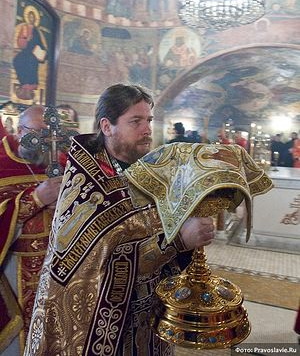
Many readers will recognize Metropolitan Tikhon (Shevkunov) as the author of the buoyant, inspiring, and irresistible book “Everyday Saints and Other Stories,” which sold record numbers of copies in Russia and has been translated into 17 languages, including English. In this brief, but powerfully insightful passage excerpted from a 2012 interview, Metropolitan Tikhon show how “the living feeling of the pulse of eternity” constitutes not only the center of the Great and Holy Feast of Pascha, but the living foundation of Orthodox Christianity itself.

THERE IS NO DEATH
By Metropolitan Tikhon (Shevkunov)
Interviewed by Valery Konovalov
Father Tikhon, why is Pascha celebrated each time not as the anniversary of the Resurrection of Christ but as the Resurrection itself?

—The Apostle Paul made an astonishing revelation about two thousand years ago. He said, Jesus Christ the same yesterday, and today, and for ever (Heb. 13:8).
Christians feel the great power of these words, if their faith is not just matter of tradition but rather a living faith; if they also feel and live their communion with God as the most important reality of their lives. This relates also to the Resurrection. Unfortunately (or perhaps fortunately) it is impossible to convey this through mere theoretical postulates. This is just how God has ordained it. If faith were no more than a theory, Christ’s Church would have withered only a few years after it began. After all, our faith is something different, it is like a living connection between God and His people, between God Who became man—Jesus Christ, and each one of us Christians.
The living feeling of the pulse of eternity, which responds in every Christian, is especially felt on the feast of Pascha, the Resurrection. Little children are aware until they grow up that death is something completely foreign, incomprehensible, and unnatural to man. We adults remember well this perception of the realty of eternity in our childhood as one of the constants of existence of a person only recently come into the world.
There are not many such constants for children, but to them they are an undoubted truth. They are their mother’s love, the daily revelation of a beautiful world, and the sureness that their existence and the existence of all those they love is eternal. We even have a song that goes, “Let mama be forever, let me be forever.”
But even in adulthood, and even at the end of one’s life, a sense of the absurdity of his own death never leaves him up to the last minutes. Every doctor and every priest can testify to this.This is by no means some sort of psychological phenomenon or self-deception. It is an astonishing reality that is open to a person.The Resurrection of Christ tells us that we are not mistaken: There is no death for a human soul, for a human personality. The revelation of the life of the age to come, the kingdom that is not of this world, and the invitation to it is the very essence of the Gospel, the main significance of the Resurrection, and the essence of the matter of Jesus Christ in the human race.
But what do we need to do, so that we can learn to celebrate the Resurrection like that — as a present, real event? After all, many people know the rule—how to bless the kulich (Easter cakes), how many times to kiss in the Paschal greeting, how to cross yourself…But perhaps we are missing the most important thing?
—Yes, every person will have to figure that out for himself. There is no other way. Christ only patiently, with unfathomable love invites every person. However, He never violates our freedom.
But if a person has not come to terms with the eternity of his life, it means that he has not come to terms with anything at all. And he has lived his life in vain. If a person has not posed these “cursed questions” to himself, according to a famous expression of Dostoevsky, and has not made every effort to honestly answer them, then that person has done absolutely nothing in life. Even if he has planted a thousand trees, built an entire city, and brought ten sons into the world. Christ has left us these words: “What does it profit a man if he gain the whole world but lose his own soul?”
This is the main question and revelation of Pascha. This is the most important thing. But what color to dye the eggs, how to bake kulich—believe me, that is the 1025th priority.
Excerpts from an interview published in Trud, Pascha 2012.
Source: Orthodox Christianity

About the Author
- Metropolitan Tikhon (Shevkunov) is the Metropolitan of Pskov and Porkhov in Russian. Originally a filmmaker, Metropolitan Tikhon became a monk and eventually the abbot of the famed Pskov Caves Monastery, founded in 1473 and one of the few monasteries in Russia to have never been closed, including during World War II and the Soviet Union period. Among other offices, he served for many years as Superior of the Sretensky Monastery in Moscow, a center of the Orthodox revival in Russia.